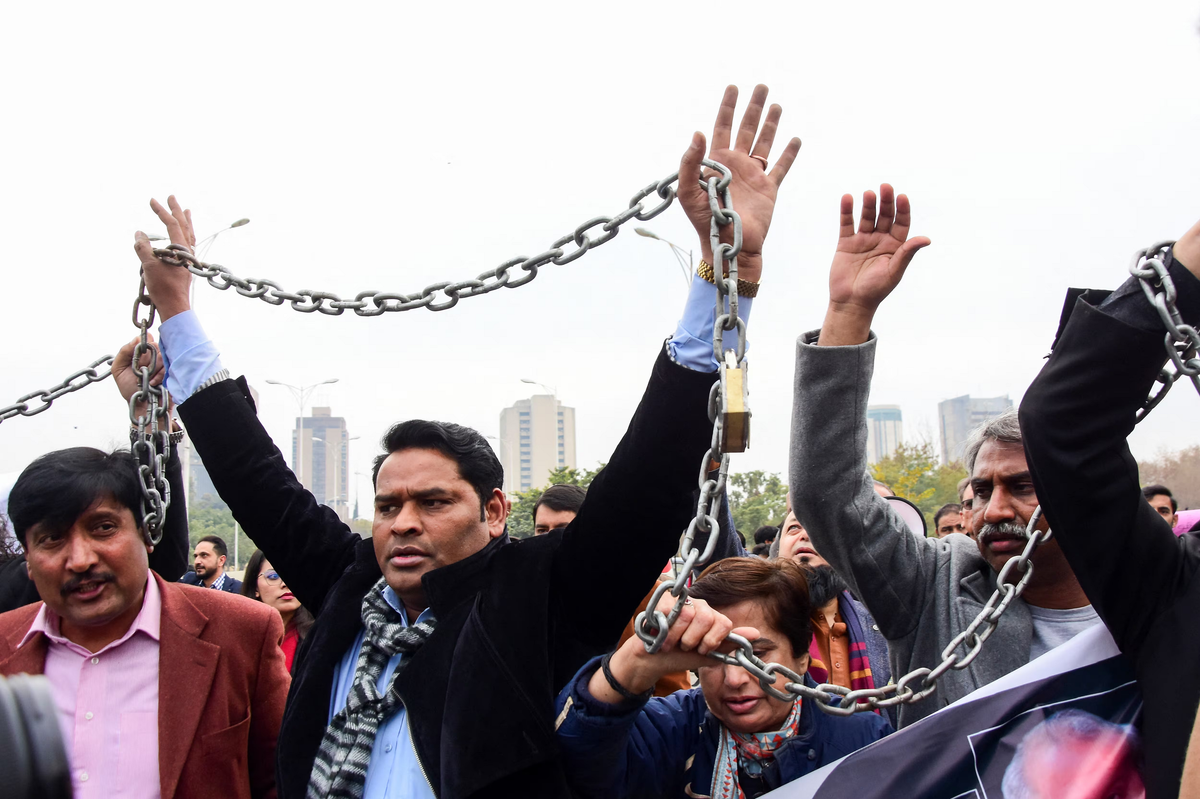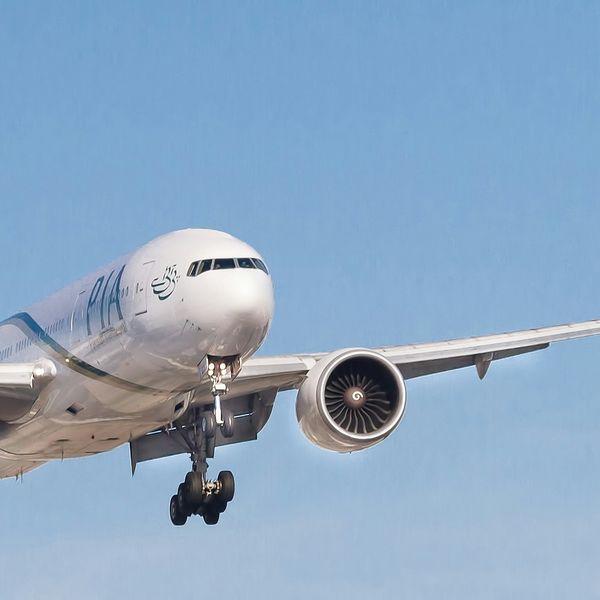Press freedom under siege in Pakistan as journalists face unprecedented risks: report
Report raises alarms about PECA law changes that let authorities suppress dissent, disguised as regulating online content

Kamran Ali
Correspondent Nukta
Kamran Ali, a seasoned journalist from Khyber Pakhtunkhwa, Pakistan, has a decade of experience covering terrorism, human rights, politics, economy, climate change, culture, and sports. With an MS in Media Studies, he has worked across print, radio, TV, and digital media, producing investigative reports and co-hosting shows that highlight critical issues.

Journalists rally against what they call, curbing press freedom and controlling the digital landscape, during a protest in Islamabad on Jan 28, 2025.
Reuters
As the world marks World Press Freedom Day on May 3, a troubling report from Pakistan underscores the growing threats faced by journalists in the country. The findings highlight an increasingly hostile environment for independent journalism, with numerous media workers reportedly targeted over the past year, amid mounting intolerance for dissent.
According to a report released by the Freedom Network ahead of World Press Freedom Day, at least 82 journalists and media workers in Pakistan faced threats, harassment, legal action, and arrests between May 2024 and April 2025.
The report paints a stark picture of the situation, with Khyber Pakhtunkhwa (KP) emerging as the most dangerous province for journalists during this period.
Titled Freedom of Expression and Media Freedom 2025, the report covers the time frame from May 2024 to April 2025 and reveals the grim reality that five journalists lost their lives while carrying out their professional duties -- three in Sindh and two in KP.
"Of the 82 documented cases of violations, KP accounted for the highest number, with 22 cases filed against journalists, followed by 20 in Islamabad, 18 in Punjab, 17 in Sindh, four in Balochistan, and one in Pakistan-administered Kashmir," the report notes.
Serious concerns have also been raised over recent amendments to the Prevention of Electronic Crimes Act (PECA), which have made it easier for authorities to target and penalize dissenting voices under the guise of regulating online content.
"At least 14 cases were registered against journalists under these revised provisions, with eight media professionals taken into custody," the report disclosed.
Between January and April 2025, the Pakistan Press Foundation (PPF) documented 34 separate incidents involving journalists and media workers, including seven registered cases, one defamation notice, three call-up notices from the FIA, two arrests, four detentions, and two abductions. "At least six assaults, two cases of manhandling, two attacks on property—including a raid—three threats, including legal intimidation and threats to family members, as well as two incidents of online harassment were reported," the PPF revealed.
Data from Reporters Without Borders indicates that over 100 journalists have been killed in Pakistan since 2000, with 28 detained and 24 going missing during the same period.
No shield for journalists
Saim Afridi, cousin of the late Khalil Jibran, former president of the Landi Kotal Press Club, shared that the family still has no answers regarding the motive behind his killing. Jibran was shot dead by unidentified assailants in Khyber district of KP on June 18 last year.
“There was no personal enmity, no known dispute—and even now, we don’t know why he was targeted,” Afridi told Nukta. “We’ve exhausted every channel, knocking on the doors of police and other authorities, but no one is willing to provide us with any answers.”
Irshad Ali, General Secretary of the Khyber Union of Journalists, told Nukta that journalists who expose corruption and lawlessness involving powerful figures often face severe repercussions. "Incidents of violence against journalists are far more common than reported," he said. "Many don’t even file complaints because the Journalist Protection Act remains largely unenforced."
Ali also noted that harassment of journalists extends beyond legal cases and physical assaults. "There are multiple ways journalists are harassed. We've raised the issue with the government on several occasions, and we hope that authorities will finally ensure proper implementation of the Journalist Protection Act."
Iqbal Khattak, Executive Director of the Freedom Network, warned that the Pakistani media is facing an "existential crisis." "The current situation is among the worst the country has witnessed in recent memory, with the state growing increasingly intolerant of tough questions—eroding the very foundations of democracy," he remarked.
Protection promised, but doubts persist
Shehzada Kokab, Director of Public Relations for the KP Police, emphasized that law enforcement takes cases involving journalists seriously. "Police and journalists go hand in hand," he remarked. "We regularly hold training sessions focused on journalists' safety, where reporters are briefed on how to protect themselves while reporting in the field or when facing threats."
He added that special security measures have been implemented at press clubs across the province to ensure the safety of media personnel.
To enhance journalist safety, the Pakistan Federal Union of Journalists, in collaboration with the Parliamentary Commission for Human Rights and Media Matters for Democracy, launched a mobile app last month.
The app enables registered journalists to activate a panic button in case of abduction, attack, torture, stalking, or other emergency situations, allowing authorities to track the threat and pinpoint the journalist's location in real-time.
Freedom Network has called for a collective effort to safeguard constitutional guarantees of free expression and dissent, urging civil society and media organizations to join forces in defending press freedom.







Comments
See what people are discussing